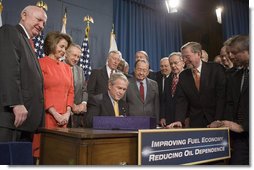 St. Louis-based AmerenUE, which serves 2.4 million electric customers and nearly one million natural gas customers in a 64,000 square mile area of Missouri and Illinois, has announced its first venture into wind energy.
St. Louis-based AmerenUE, which serves 2.4 million electric customers and nearly one million natural gas customers in a 64,000 square mile area of Missouri and Illinois, has announced its first venture into wind energy.
 This Ameren press release says the Midwest power giant will buy 100 megawatts (MW) of wind power from Horizon Wind Energy’s Rail Splitter Wind Farm located near Delavan, Illinois, honoring Ameren’s promise to add 100 megawatts of renewable capacity to serve its Missouri customers by 2010:
This Ameren press release says the Midwest power giant will buy 100 megawatts (MW) of wind power from Horizon Wind Energy’s Rail Splitter Wind Farm located near Delavan, Illinois, honoring Ameren’s promise to add 100 megawatts of renewable capacity to serve its Missouri customers by 2010:
“This is an exciting day for AmerenUE,” says AmerenUE President and CEO Tom Voss. “It is our first venture into wind development. We will be looking for additional opportunities as we increase the amount of renewable resources in our generating portfolio. This is a significant first step toward further diversifying our fuel mix and demonstrating our commitment to environmental stewardship.”
(Thursday’s) announcement is a culmination of a thorough, year-long review of proposals UE sought earlier this year. AmerenUE intends to sign a 20-year purchased power agreement (PPA) for the wind farm’s output. The PPA has not yet been signed, and terms are still subject to negotiation. Once the agreement is signed, construction is expected to begin in the spring of 2008, with the project completed by the end of 2008. Sixty seven turbines will be located on the site, with each turbine capable of generating 1.5 megawatts of electricity.
Horizon is owned by Portuguese utility Energias de Portugal, S.A. (EDP), which produces more than 1,700 mgawatts of renewable power In Spain, Portugal, and France with another 3,000 megawatts worldwide due to come on line by the end of next year.


 The American Lung Association of Minnesota has teamed up with the Minnesota Soybean Growers Association to offer a scholarship to a senior who writes the best essay on biodiesel.
The American Lung Association of Minnesota has teamed up with the Minnesota Soybean Growers Association to offer a scholarship to a senior who writes the best essay on biodiesel. Chemical engineers at the University of Arkansas were successful in using so-called supercritical methanol to transform chicken fat and tall oil fatty acid into biodiesel fuel, the university said Wednesday in a news release. The yield was greater than 90 percent, the university said.
Chemical engineers at the University of Arkansas were successful in using so-called supercritical methanol to transform chicken fat and tall oil fatty acid into biodiesel fuel, the university said Wednesday in a news release. The yield was greater than 90 percent, the university said. The credits are “absolutely critical for making a market in the United States,” said Rhone Resch, president of the Solar Energy Industries Association. “What will happen is you will see solar installations start to drop off in the second quarter of 2008 if they are not extended.”
The credits are “absolutely critical for making a market in the United States,” said Rhone Resch, president of the Solar Energy Industries Association. “What will happen is you will see solar installations start to drop off in the second quarter of 2008 if they are not extended.” Congressional action in the early part of 2008 is needed “to keep investors from getting nervous,” said Greg Wetstone, governmental affairs director for the American Wind Energy Association.
Congressional action in the early part of 2008 is needed “to keep investors from getting nervous,” said Greg Wetstone, governmental affairs director for the American Wind Energy Association. President Bush’s signing of H.R. 6, the Energy Independence and Security Act of 2007, has gained the praise of the National Biodiesel Board.
President Bush’s signing of H.R. 6, the Energy Independence and Security Act of 2007, has gained the praise of the National Biodiesel Board. “The U.S. biodiesel industry praises President Bush, Speaker Pelosi, Majority Leader Reid and the bipartisan supporters of biofuels in Congress who worked tirelessly to enact an expanded Renewable Fuels Standard (RFS). This is good public policy that meets the needs of consumers and addresses America’s pressing energy security concerns by increasing the use of clean burning, domestically produced biofuels like biodiesel to reduce our dependence on foreign oil. The nearly five-fold expansion of the RFS in this legislation is truly a landmark achievement.
“The U.S. biodiesel industry praises President Bush, Speaker Pelosi, Majority Leader Reid and the bipartisan supporters of biofuels in Congress who worked tirelessly to enact an expanded Renewable Fuels Standard (RFS). This is good public policy that meets the needs of consumers and addresses America’s pressing energy security concerns by increasing the use of clean burning, domestically produced biofuels like biodiesel to reduce our dependence on foreign oil. The nearly five-fold expansion of the RFS in this legislation is truly a landmark achievement. The “2 Million Mile Haul”… halfway through the study at this point… is looking at the benefits of using 20 percent biodiesel blend (B20) and is being conducted by the Iowa Soybean Association (ISA) in partnership with Iowa Central Community College, Decker Truck Line Inc., Caterpillar Inc., the National Biodiesel Board, Renewable Energy Group, Inc. and the U.S. Department of Agriculture.
The “2 Million Mile Haul”… halfway through the study at this point… is looking at the benefits of using 20 percent biodiesel blend (B20) and is being conducted by the Iowa Soybean Association (ISA) in partnership with Iowa Central Community College, Decker Truck Line Inc., Caterpillar Inc., the National Biodiesel Board, Renewable Energy Group, Inc. and the U.S. Department of Agriculture.  “The trucking industry is by far the single largest consumer of diesel fuel, using 38 billion gallons annually,” said Grant Kimberley, ISA director of market development. “This study demonstrates in a real-world environment that biodiesel can be used successfully year-round.”
“The trucking industry is by far the single largest consumer of diesel fuel, using 38 billion gallons annually,” said Grant Kimberley, ISA director of market development. “This study demonstrates in a real-world environment that biodiesel can be used successfully year-round.” Don Heck, coordinator of biotechnology and biofuels programs at Iowa Central Community College in Fort Dodge, Iowa, said, “Although we have data from only the first year of the study, we are pleased with the results to date. Preliminary results are that B20 biodiesel performs similarly to 100 percent diesel. We found a slight decrease in overall fuel efficiency for the B20 group of trucks, but it was not statistically significant. In fact, the difference was several times smaller than the driver-to-driver variability in fuel efficiency within each group.”
Don Heck, coordinator of biotechnology and biofuels programs at Iowa Central Community College in Fort Dodge, Iowa, said, “Although we have data from only the first year of the study, we are pleased with the results to date. Preliminary results are that B20 biodiesel performs similarly to 100 percent diesel. We found a slight decrease in overall fuel efficiency for the B20 group of trucks, but it was not statistically significant. In fact, the difference was several times smaller than the driver-to-driver variability in fuel efficiency within each group.” Smiling Earth Energy has plans to build a 320-million-gallon-a-year biodiesel plant along the Chesapeake Bay in Virginia. But the company has had its troubles recently, including a lawsuit by an Oregon biodiesel company for failing to provide the promised $310 million in financing for a West Coast biodiesel plant… and then refusing to return a $100,000 deposit to the Oregon company (see
Smiling Earth Energy has plans to build a 320-million-gallon-a-year biodiesel plant along the Chesapeake Bay in Virginia. But the company has had its troubles recently, including a lawsuit by an Oregon biodiesel company for failing to provide the promised $310 million in financing for a West Coast biodiesel plant… and then refusing to return a $100,000 deposit to the Oregon company (see  The National Biodiesel Board is applauding the U.S. House’s passage of the Energy Independence and Security Act of 2007 by a 314-100. The U.S. Senate passed identical legislation last week, and President Bush has indicated he will sign it.
The National Biodiesel Board is applauding the U.S. House’s passage of the Energy Independence and Security Act of 2007 by a 314-100. The U.S. Senate passed identical legislation last week, and President Bush has indicated he will sign it. “We congratulate the House and the Senate for the bipartisan efforts of policymakers who worked together to pass this landmark legislation that will help America depend less on foreign oil and more on clean-burning, domestically produced biodiesel,” said NBB CEO Joe Jobe. “Biodiesel producers across America stand ready to meet the aggressive renewable goals provided for in this bill.”
“We congratulate the House and the Senate for the bipartisan efforts of policymakers who worked together to pass this landmark legislation that will help America depend less on foreign oil and more on clean-burning, domestically produced biodiesel,” said NBB CEO Joe Jobe. “Biodiesel producers across America stand ready to meet the aggressive renewable goals provided for in this bill.”